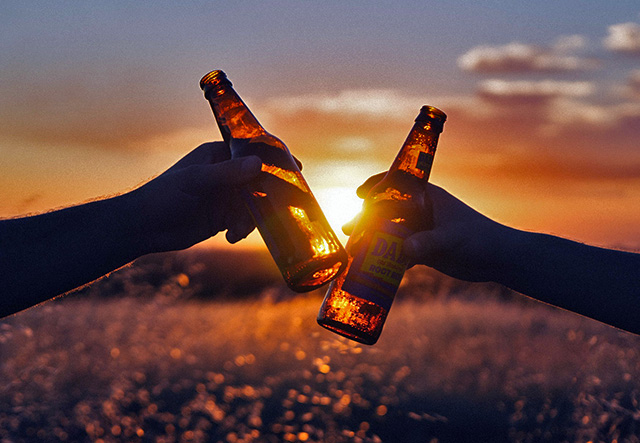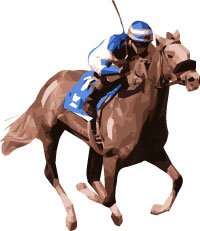For fitness lovers at all levels, from weekend warriors and occasional gym-goers to elite committed athletes, alcohol may play a part in your life. It is one of life's most socially influential and readily available legal drugs. And it's not all bad! Some athletes will happily give it up; others may find abstinence a little more difficult. So if you do enjoy the occasional beer at a bbq, wine out at dinner, or bubbles at a celebration, then these tips could help keep your love of sport balanced with socialising.
Moderation – there is some evidence to show health benefits of moderate consumption of alcohol. However, there is no scientific agreement (yet) on quantity guidelines for athletes, and at what point too much will have a negative impact on training adaptations. Athletes should be guided by recommendations for the general population, to reduce the risk of harm from alcohol-related disease or injury. Regular heavy drinking can often lead to poor food choices and less than optimal fueling for intense training periods. This can lead to nutritional deficiencies, inadequate protein and carbohydrates, and an irregular pattern of eating meaning missing out on adequate pre-fueling and snacking required for optimal nutrition.
- The Australian Government recommends healthy men and women should drink no more than 10 standard drinks a week and no more than 4 standard drinks on any one day.
- Binge drinking is more harmful and should be avoided.
- You should also include 1-2 alcohol-free days per week to allow the liver to have a break from the toxin that is ethanol.
Hydration – It is well known that alcohol has a diuretic effect on the body, reducing total fluid volume, which leads to dehydration. This is true for full strength alcohols, e.g. 4% beer, wine and spirits, but is not as evident for low strength beverages. Alcohol consumption also causes electrolyte imbalances, which can have effects on cramping. My tips would be...
- Drink plenty of water and electrolyte drinks at all times which helps optimise hydration and reduce hangover severity.
- Be sure to rehydrate adequately after exercise before having your first alcoholic beverage to celebrate.
- Have a water or diet soft drink 'spacer' between alcoholic drinks during an evening out.
- Consume a large drink of a rehydration solution like Hydralyte or equivalent before you go to bed.
Energy content – The kilojoule content of alcoholic beverages is broad and complex, depending on serve size, type of drink, and percentage of alcohol. But the bottom line is that one 10g standard serve of alcohol (100ml wine, 30ml spirits, and a middy or 285ml of beer) is about 300kJ or 70 calories. This can add up after a few drinks, as well as including the kilojoules of mixers, or sugar syrups and cream often used in cocktails. Unfortunately, the energy from alcohol is not in the right form to be used by the muscle for fueling exercise; instead, it is more likely to be converted into fatty acids for storage, not helping an athlete keep lean.
- Having water or a diet drink 'spacer' between drinks can help not only keep you hydrated but also help keep the kilojoules down.
- Avoid Cocktails where possible, as they can be loaded with extra calories
- Stick to diet soft drinks (sodas) for mixing with spirits
- Try out some mid- or low-strength beers for lower calorie intakes
- Aim to drink slowly to reduce the total number of drinks consumed
 alcohol is a part of life, even for athletes
alcohol is a part of life, even for athletesTiming – Knowing the immediate detrimental effects of alcohol consumption on reaction time, balance, fine motor skill accuracy, and vision, it makes sense to advise athletes to avoid alcohol immediately before and during exercise, as this would certainly prove to be problematic. Having a hangover can also lead to an increased risk of injury. Timing of intake will depend on the frequency of training during the week, and safety and recovery will depend on the volume consumed.
- Time to recover from intoxication prior to an exercise session may depend on the level of inebriation, but 48 hours should be adequate for 4 standard drinks
- If training daily or second daily, then a single beer or glass of wine in the evening, should be metabolised with a few hours of consuming, and shouldn't cause any hangover effects for training the next day.
- If training in the morning, avoid alcohol the night before
- Choose to drink less on 'high training' weeks that have a high level of intensity or duration
Recovery and Injury – Post-exercise is the safest time to 'have a few drinks', ensuring that you have followed all the proper nutritional recovery guidelines. If you have sustained an injury during an event or bout of exercise, the damage needs to be repaired in the subsequent days, without the added complexity of alcohol in the bloodstream affecting vasodilation and inflammation. Depending on how bad the injury is will determine how long you should abstain. Also, if the injury is more severe and you are not able to train for an extended period of time, you may be tempted to drink more during this phase, however, not only will you be delaying the repair process you are also taking in lots of unwanted calories.
- Avoid alcohol in the 1-2 days after a minor injury, to allow the damage to be repaired
- For a longer time off due to injury beware of the calorie load of extra alcoholic drinks and ensure that you minimise any weight gain
- If you've heard that beer could be a great post-workout recovery beverage because it contains carbohydrates and electrolytes, you are mistaken! The average beer does not have anywhere near enough carbohydrates or electrolytes for optimal recovery from a long workout with a large sweat loss.
- A low alcohol beer (<4%) does not have the same dehydrating effect as full-strength beer though, and is a better option post-exercise. Ensure you still adequately replenish carbohydrate and protein stores.
Related Pages
- Alcohol use and athletes - facts and physiology
- Healthy eating and sports performance
- Supplements for Athletes
- Alcohol Myths Debunked!


 Current Events
Current Events